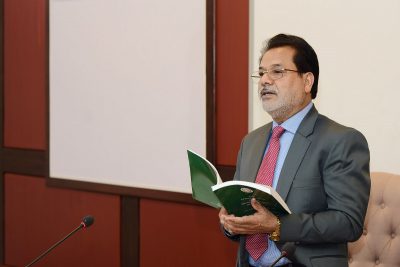
Pakistan Institute for Parliamentary Services (PIPS) July 2, 2019: Fourth Parliamentary Studies Certificate Course (PSCC) – Module I commenced in the morning of July 2, 2019 at PIPS. The course has been designed for the Officers of the National Assembly of Pakistan keeping in view the peculiar needs of this esteemed Parliamentary Institution. Assistant Director PDP, Mr. Taj Mohammad moderated the session and the event commenced with the recitation of verses of holy Quran by one of the participants of the programme, Mr. Muhammad Bashir. The participants were then given a brief overview of the program, assessment criterion and other details. Afterwards, a brief round of introductions was conducted in which the Officers shared their work experience.
Next to be invited was Executive Director PIPS, Mr. Muhammad Rashid Mafzool Zaka, who welcomed the worthy resource persons Special Secretary, Mr. Qamar Sohail Lodhi and Additional Secretary Mr. Muhammad Mushtaq as well as the course participants. In his welcome speech, he emphasized on the importance of hard work and parliamentary knowledge as a path to personal excellence and success.
Director General (PDP & IT) PIPS, Ms. Samer Awais also spoke on the occasion. She presented a synopsis of the program and informed the participants that the module was designed to enhance the abilities and capabilities of the participants working in the Parliamentary sector. She further highlighted the results of previous programs and how they had helped the National Assembly Secretariat to create a niche in the civil and public sector services of Pakistan.
Mr. Qamar Sohail Lodhi formally inaugurated the programme by welcoming the participants. He initiated the session by shedding light on the Rules of Procedure and Conduct of Business of the National Assembly (2007). In his session, he described that the Rules were directly framed under the Article 67 of the Constitution of Pakistan and could be formulated or amended by the Parliament alone. While defining the jurisprudence of Rule he described that a “Rule” was “any recognized principle which was enforceable”. The legal recognition and a proper mechanism of enforcement were the important features of a Rule. He further explained the history of Rule making process in the Assembly and termed the year 1992 as a turning point in the parliamentary history as a committee was formed for framing Rules. He highlighted four important functions of the house conducted through these Rules i.e., Legislative, Non-legislative, Elective and Financial functions. He emphasized that the governments were bound by the approval from the house for any spending and continued the session by defining the Money and Financial Bills. He elaborated that all financial bills were money bills however, not all money bills were financial bills. He further explained that only money bills were sent to standing committees. While explaining the difference between procedure and conduct he taught that procedure was a process of Rule before it was placed in front of assembly i-e lists, notices, admissibility etc. Whereas, conduct of Rule included motions, voting, resolutions, point of orders etc. In the end Mr. Taj expressed his hope that the course would assist in the professional grooming of participants.